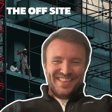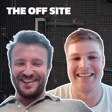Become a Creator today!Start creating today - Share your story with the world!
Start for free
00:00:00
00:00:01

Are We Seeing the Beginning of a New Era in Construction Planning?
This week, Jason and Carlos welcome Sam Hanisch back to the podcast, to get his experience and insight on the following topics:
1. Scheduling and planning software Outbuild, and its place in the rising wave of investment in planning tools.
2. American contractor Tutor Perini's strategic shift to limit project bids to $500 million, and whether that's a sound strategy in today's climate.
3. The unique Antwerp Port House, detailing the challenges of building a new structure over a heritage-protected building.
Follow Carlos on Linkedin | Follow Jason on Linkedin | Check out Aphex
Transcript
Introduction to the Offsite Podcast
00:00:00
Speaker
Carlos, what do you reckon? Did everyone just, did everyone in contact just realize that the schedule's important? Yeah. The light switched suddenly when it went, oh wait, maybe schedule student run jobs.
00:00:19
Speaker
Welcome back to the offsite podcast. As usual, I'm Jason Lansini, and I'm joined by Carlos Cavallo. And this week, a special returning guest, Sam Hanish, although it does say in my notes here, Sam punish, um, which is the, what you are on the weekends, maybe, uh, gay folks tend to profile.
00:00:45
Speaker
guys i complete the moache like yeah I'm a hat, I guess you have no context out there. but Awesome cast, did you have a fact about Ninja Selma?
00:01:03
Speaker
Unbelievable ah prediction there. no No, really nice good news story this week.
Idris Elba's Wind Farm Initiative
00:01:08
Speaker
So, Idris Elba is sort of pushing, championing and got signed off for a an organisation here called Octopus Energy to develop a wind farm in Sierra Leone.
00:01:20
Speaker
So the wind farm will power something like 2,000 homes. And yeah, Sierra Leone only 5% of the population have access to electricity. So yeah, nice, good news story for Friday morning. You said three things there about what he did, but I still have no idea what the hell Idris Elba has to do with his birthday. What did you say?
00:01:44
Speaker
cha hey um yeah he's like he's He's pulled together Octopus Energy, obviously people from the Sierra Leone government to get signed off for a ah wind farm. yeah It was part of COP28 announcement. Obviously he's a big name. an activity project It gets the eyes. yeah Yeah, he's actually going to deliver it.
00:02:08
Speaker
Yeah, that's actually that was yeah car it's a ah really good story. But I don't know if I would have like forced us to rerecord the podcast in order to slot that in at the top. Yeah, that now that was definitely my fault. It's nice to have one that's ah positive rather than the usual things we put out, like Russia's doing Google.
00:02:27
Speaker
just not sorry ah That was the good news story
Weather Contrasts: Cold vs. Warm
00:02:31
Speaker
of the year. um the So any news what's going on on your side of the world this week, Carlos? It's snowing across most of the country and it's November. So yeah, it's um it's just really cold. So um yeah, when we contrast that to Sam living in Bali and you talking about a company beach day, it's ah pretty sad stuff.
00:02:57
Speaker
you say life yeah What are you whinging about here that you've had summer? Yeah, like three weeks. I would i wouldn't call that summer, but yeah but yeah. If it's any consolation, it's currently bucketing rain, which is why I'm like soaked through my hair as well. Over here, we are prepping to by the time this goes out. Yeah, it'll be the week before we're prepping to go to a conference in Melbourne next week.
Project Controls Expo Preview
00:03:24
Speaker
where we'll be exhibiting on a bunch of panels, getting to go and visit and meet a whole bunch of customers. So nice. Get which cut a week away. Project Controls Expo. So not the one that everyone's at this week in the US of Groundbreak, ah which I've got like a ton of messages being like, are you here? what No, I'm not. I'm at the one in the project controls expo in Melbourne. guys Yeah. Groundbreak looks, um, it's a lot bigger than I always appreciated it for. Like the amount of vendors there is quite substantial. and um Yeah. It looks like a party. Yeah. Yeah. Pretty much.
00:04:03
Speaker
ah Let's go into it because it kind of relates to a couple of topics that we're talking about. so We've got three things we're going to dive into this week.
Impact of US Elections on Construction Tech Investments
00:04:12
Speaker
The first thing we're going to dive into is this like significant uptick in um startup investment and mergers of acquisition in ah construction technology seems correlated also with maybe some of the US election results. We're going to dive into one company in particular, Outbuild, who just raised ah a solid series a round Then we'll talk about Tudor Perini, a US contractor that we discussed a couple of months ago after they've announced or told clients that they're deciding to sit out bidding projects, specifically mega projects because they've got too much work.
00:04:51
Speaker
And then finally, we're going to dig into one of the most unique buildings um I've ever seen, which is a modern port office in Antwerp. So biggest topic off the bat, I guess to frame the um to frame the conversation.
00:05:09
Speaker
Broadly, I'd say we're seeing as an industry of let's say construction technology generally an uptick in investment um or acquisition type activity. Procore even at Groundbreak this week just gone. I've been making a bunch of acquisitions announcing a number of acquisitions.
00:05:30
Speaker
There's also a whole bunch of kind of early stage seed series A funding announcements over the last, let's say 12 months starting to really ramp up more recently um from construction software and technology vendors.
00:05:47
Speaker
Specifically a whole bunch within kind of scheduling and planning with it, which is interesting. The one in particular that was announced a week ago is Outbuild. So it's an American planning and scheduling company. They announced an $11 million dollars Series A funding round.
00:06:03
Speaker
led by a VC and they've got a bunch of corporate venture firms so Hilti and Trimble in the round.
Outbuild's Series A Funding Success
00:06:11
Speaker
For those that don't know what Outbuild is, it's kind of this all-in-one planning scheduling platform so there's like a CPM component in a master that's supposed to replace your master schedule and whatever tool that exists in and then they've got kind of this last planner look-ahead layer weekly work plan and then kind of the standard last planner, PPC type of reporting built into the platform. So it's the all in one, um replace all of your planning scheduling tools in one. And as I mentioned before, this comes off the back of some other investments, so plan error, raising a bunch of money.
00:06:49
Speaker
um outbuild and then we've also seen announcements from Autodesk building um a field scheduling module called work plans that they're testing with some customers and Procore announced literally just this week at Groundbreak that they are revamping their field scheduling module with a whole bunch of new updates. So with that kind of like lengthy intro, Carlos, what do you reckon? Did everyone just did everyone in contact just realize that the schedule is important?
00:07:19
Speaker
yeah The line switch suddenly went it went, oh wait, maybe schedule student run jobs. um no it sir it's It's great to see that like an area that we know well, there's clearly this this traction of i guess mindset or view that it's super important to have this schedule. It's super important to involve the site teams in planning and coordinating projects.
00:07:43
Speaker
The last planner system, obviously a system we know well and we know lots of our own customers that want to adopt the last planner system and and that's how they see the best way to coordinate a project and track performance and and ensure that it's in the hands of those at the site. So it's really, the investment in that space is really sort of validating this market or this type of tool and the the amount of investment shows that it must be working, it must be what customers want because multiple organizations are getting traction within the space. And it's, yeah, it's outbuilt. It looks pretty good. I'd say it's one of the better tools that we've seen from ah from a planning point of view. It's um very much sort of a connected space from master schedule all the way down to the the the work face. um It does feel like it's more of a small project, classic building job because of some of the functionality that it sort of suggests through looking through the sort of video content.
00:08:37
Speaker
Yeah, it looks it looks very interesting. I think it's probably, their challenge now is probably dealing with planners and like contract requirements if they do step up out of the smaller the smaller building projects into that government or private large private schools. Yeah, i think I think you raise a really interesting point. like The idea of this kind of all in one platform, I think would be really appealing for a certain segment of the market, specifically that kind of mid market where it probably doesn't make sense or pencil out to have a kind of like
00:09:13
Speaker
full planning tool like a P6. A lot of the jobs in that market will definitely not have planners on the the project. that just doesn't Again, it doesn't pencil out. They won't need the functionality of P6 really. Exactly. So for those folks, I'd imagine their stack right now is maybe some smart sheet, maybe some Microsoft project, maybe some spreadsheets, that type of ah thing. And then they're probably running some other thing for their last planner routine. So for that mid market, I'd say that that kind of, it would make a lot of sense. And
00:09:46
Speaker
Yeah, you're right. Once you get to the major projects, it all the not every market is the same. I think that, Sam, just kind of teeing up a question to you.
00:09:59
Speaker
If you, you know, having kind of relatively recently been on the customer side, I'd say the marketplace is fairly flooded. I used to, like I like to call it the like a sea of like blue logos and names that you can't really quite remember. yeah um And they all have different ah things that they focus on or different angles, but they're all kind of loosely in this kind of planning, scheduling, last plenary space.
00:10:26
Speaker
yeah I guess now or as a customer, how would you think about the categories or what to like look for or um to discern between them?
00:10:37
Speaker
Yeah, it's really, um, it's interesting, like going on both sides, but thinking back, you'd often see these products come through and like you look at this product outbuild and it's really just wouldn't have been appropriate for what, you know, we were building most of the time. And because you're sitting in your own sort of market, you're really looking at these products going, who, the like who's using this, like they to completely missed the mark.
00:11:02
Speaker
And it really just shows why there needs to be such a raft of products or like how these products can get out there and exist because there is so many niches out there with their own sort of use cases. Like when I look at this Apple build product, there's a lot of stuff there. like That's really interesting. But then you try and frame it around how I would use it when I was building stuff on big construction projects. And it was really hard to make that link.
00:11:26
Speaker
um But yeah, there's a ton of stuff in there that looks super valuable. You can just imagine that there's someone, like I see the things that, you know, when I look at software that are helpful for what I'm doing, there must be a bunch of people out there that look at Outbuild and just the initial offering in the videos and go, wow, that's that's amazing. That might is just solving a bunch of things that are causing headaches every week.
00:11:50
Speaker
Yeah, I think that, um, you can start to see as there's more entrance kind of join the market, a, some like loose bucket start to form. I think this is like early thinking, but I would say that there's definitely this category of like, let's say digitizing last planner, you know, following its ceremonies and artifacts and cadences or basically like taking it off a whiteboard, put it in a tool.
00:12:15
Speaker
And we've talked about a couple of them on on the podcast before. Then there's like another category of tool that like outbuild would kind of sit in, which like it's this all in one, replace the whole stack, buy one tool, stop paying smart sheet and project and whatever, and just pay one fee, run the job. um And I'd say like a let's build out of Europe is probably in a similar category. And then they also still have this last planner thing underneath it.
00:12:43
Speaker
And then there's like the master schedule ah competitive space where you've got Microsoft projects still apparently doing some things to be a little bit more competitive with P6. Astor obviously is in that space and all signs point to plan error trying to kind of ah tackle that ah to a degree as well. It's interesting. I don't know if either of you have any thoughts about, you know, Sam, you mentioned that it's like a, it's not a homogenous market.
00:13:11
Speaker
there are these like different segments within it. It's interesting to think about what would what the right solution might be
Market Segments in Construction Tech
00:13:19
Speaker
in each market. So we talked about kind of that mid-market maybe the kind of mid-market building job where maybe something like an all-in-one solution is a good fit. It'd be interesting to think about what the if there are any kind of in the other segments like major projects or whatever where you see another stack that that fits um more appropriately. I think it's really, it's horses for courses. Like you, you look at the software really needs to fit around what you're trying to do and alleviate. I think we were talking to a project the other day and they made the comment, the thing that was so like, was so helpful or like the hardest thing about adopting software is trying to change what you do to fit the product.
00:14:02
Speaker
and And so there's this thing around like trying to reduce friction where you know you imagine it would just be impossible to make something that fits what everyone's trying to do. um And so when you look at these these tiers, you sort of got to take a position on well what does like what's important to this market and what can we effectively improve for them without making their life a massive headache to change change their system to to suit us.
00:14:29
Speaker
and And really it comes back to, well, what can a contractor get away with with their client? Because the client essentially sets the rules up for them. um And so like we you know you look in these major scheme spaces that the clients are setting fairly hefty rules around master schedule requirements, reporting requirements. And so there's an initial gate that they have to pass through no matter what they want to do. um And you know everything outside of that is, I guess, up for negotiation. but I really think it stems from you know the client and the industries they're working in. Yeah, and the parameters on the project. like I'd say in the space that that um that we work ah all the time in like the major projects and infrastructure space,
00:15:12
Speaker
The parameters are, you know, you have a client that's dictating something that requires the master's schedule to be managed in a certain way. You also have very large teams and lots of sub-discipline teams that are having to do planning and coordination on a very large scale. And so that drives the need for multiplayer.
00:15:29
Speaker
Um, which a lot of these tools don't have like baked right in, but but may not be needed on a, um, when the team is smaller. And then the other, uh, the other thing that like happens on the very large project is sometimes that last planner system fully implemented in the way that it's kind of written down causes you to have. Okay, I've got a master schedule, then I have ah a number of look-a-heads, then I have a number of weekly work plans. And so you end up with the like proliferation of versions of the plan floating around. And one of the biggest pain points on major projects is like, everyone says they're on schedule, but to what schedule? And so the last thing you want is more versions of the plan. You really want two versions. You want the contract schedule and then the thing that everyone's delivering to.
00:16:15
Speaker
And so I think, the like you said, that there is like there is horses for courses. And I think that we obviously built something based on what what is definitely the set of pain points in major projects. And this this looks like it's really nailing that kind of mid-market.
00:16:33
Speaker
Uh, super excited for the outbuild team. And, um, yeah, it's keen to see where they, they take it from here. One actual note before we jump off this topic, Carlos, I know we've talked about, uh, P6 a number of times before in previous episodes. What do you think this starts to, is there a message here for like Oracle and P6? You've got an increasing space of, uh, software vendors, building planning and scheduling tools that are At risk of, yeah, continuing to eat away at the cash cow seats and licenses for P6. It's interesting if, because if, if you're head of product for P6 or Oracle, whatever that title might be.
00:17:18
Speaker
I don't think they're going to do that. You've got two choices.
Oracle's Competitive Challenges
00:17:21
Speaker
Yeah, never done anything for 10 years. So yeah, if you're a P6, you've kind of got two options, because if they see and believe that there's this stack of planning tool market where people want interconnected schedules between contract and site, if they believe that story and see that story and are hopefully close enough to customers to understand that that exists,
00:17:45
Speaker
then you either think about tackling the the site level space, which is probably not what they would opt for because they don't really build projects from scratch. i You can't imagine them wanting to go into that space. So if they do believe the story, they've got to think about, right,
00:18:02
Speaker
tight integrations so they can start talking to customers about the thing that they actually want and need. Um, so you're going to have to, they would have to sort of pick their horses and then obviously classic Oracle, they'd probably integrate with a few workout, which one is leading the race. and them or whatever they might do to increase their stack. From a product point of view, they probably just want to tighten their grip, the schemes that they have, and try to push that out rather than building a second project and growing that from scratch. Yeah, it's an interesting one, but it's hard to imagine a project right now that would opt for like an outbuild over a P6. If they're in P6, they're probably, it's going to be really hard. You mean in the major project space, like if they've got a planning scheduling function.
00:18:44
Speaker
Yeah, but even like Asta, like a smaller project, building projects in this country, you'd have to be really slick to jump in with a picture product like this to a team that use Asta. Like, that would be a really difficult thing to do. So I've just gone in a full loop there, but I think... That's okay, Sam, ah you got any thoughts otherwise up?
00:19:05
Speaker
No, no, move on with talking. Yeah, it all that all rapid. I think that I think the why I would go further than you Carlos I'd push I'd say that Oracle have like ah a big problem coming down the line that they're going to have to sort out, which is The startups like Outbuild or the other set of ones that we've talked about before can continually to ah continue to pull away the kind of field scheduling component. There are lots of contractors right now that are doing some level of this in P6. There's just a bunch of seats that they're selling for it. They're going to eat away that that there. And like I said before, we've got like Autodesk and Procore building ah field scheduling modules that they're going to bundle into their build products for free.
00:19:49
Speaker
Uh, and so yeah, sure. P6 can like still be this like spot that the schedule is authored for the major projects, but I think it's a fraction of the seats that someone's going to need. And so they need to do something about this. Cause I'd say that they're like lean task management thing is like dead on arrival. I don't think i've anyone that's touched it says it's a, uh,
00:20:13
Speaker
Piled, I won't, yeah. Consistently poor feedback. Yeah, consistently poor feedback. But like, yeah, that this is just going to continue to eat away seats and they have to do something because, yeah, if if that happens, plus like the reporting side keeps eating away seats, you know, you'll you' end up selling an order of magnitude less seats per customer. You can let the yeah Oracle guy i know next week at the expo of who you're concerned.
00:20:44
Speaker
ah Yes. All right. That's the segue.
00:20:49
Speaker
ah They had a product. All right. So on to good news. um After notifying its investors of a project pipeline amounting to a total of 14 billion US dollars, the CEO of LA-based contractor Tutor Perini has said that the company will take a step back from bidding on multi-year mega projects ah instead setting a maximum limit of $500 million dollar on the projects that they're going to bid and pursue.
Tutor Perini's Project Bidding Pause
00:21:20
Speaker
They cited capacity issues as leading reasons as to why. So I guess the question is, is this like big newsworthy update? Is it something that's like business as usual? Sam, you've probably seen this happen once or twice before.
00:21:34
Speaker
When I first read this, I don't know how familiar you are with the movie Dodgeball, but there's the Jason Bateman plays this commentator who just says dumb shit. And there's a bit where the other commentator says, oh, average Joe's is going to forfeit. And then he goes, oh, it's a bold, bold strategy. You can see if it pays off. That's all I can think of when I read this. I'm like, I don't know how this is paying off. go But now, when you sort of drill down into it, you you probably think, I think it is newsworthy. It probably happens more than we think. But I guess because they have investors, they've got to announce this stuff. The stock took a bit of a dive, I think, after it as it would. but
00:22:14
Speaker
Yeah, you youve got to think that there's some smarts in there because there's a bunch of contractors who went out and did their arse over crisis through COVID, which is you know stuff that's not quite related, but there's something to be said about you've got enough workload, we've got enough people, like why are we going out to chase down a heap more work? So I think it's ah yeah i think it's a good strategy.
00:22:36
Speaker
Yeah, a bold strategy. Carlos, do you have, ah you've got, you've got Tutor Prini in your portfolio. You've noticed the stock taking a dive. Lucas isn't eating this week. I'm not sure. I couldn't, I don't know why it's a good news story. Well, I just meant that in the sense that the last one was us ripping into Oracle. So it's better than that. No, so I think if if that news story came out and said, um we're no longer bidding for more than $500 million dollars jobs,
00:23:06
Speaker
whilst we do X to improve or increase our ability to deliver more because we're winning projects and spin it in a good news story way of we're doing some stuff behind the scenes to increase capacity rather than looking at that if you're existing projects you're like these guys are on rocky ground because they're at capacities there's gonna be delays and all sorts of issues because they're going to be struggling. If you're a shareholder you're like this is the least exciting stock in the world now because they're not going to go and win big jobs. They're going to flatline for the next few years and that must be why the share price had a bit of a tank.
00:23:39
Speaker
In terms of like partnerships with clients, like if you've built up a type load of momentum and then you go, oh cool, we've got enough. See you later. Everyone else at your competing gates is going to have more advantage on the next bid. So it's hard to see a good news story out of it. Do you think it needed a bit of PR, PR fluffing before it went out?
00:23:57
Speaker
Yeah, I think a PRT would, you could spin it in a positive way and like use it. I think they've done that exactly. It says it says they've ah they've they've taken a break who characterise, the CEO characterise the pause as a short-term hiatus from bidding for some of the larger pursuits.
00:24:14
Speaker
yeah sure read it cha chi beauty is getting good these days but yeah but But why not phrase it in a way of if the market's there and you're successfully winning jobs, why not spin it in a way of like they're doing a more sensible thing to allow the company to grow in the right way rather than go over their capacity. Where it's just like, oh, we've got enough. Thanks, everyone. And a public company is a bit odd. I think it's like a ah ah slow news day, possibly. I think it happens um ah pretty often. I've seen it happen in kind contractors I've worked for before where When the market gets a bit boomy, the the problem is that a project that you win ends at some point. And in order to deliver the project, what people can end up getting caught in is ah ramping up the workforce or the employee base in order to deliver those projects. So they're employing people on like like employee agreements, so full-time contracts.
00:25:12
Speaker
The market gets really competitive, so you start paying pretty exceptionally high salaries. And at some point, as is construction, it does a big U-turn and starts going in the other direction. You've got a bunch of people that are in excess of what you need, and you've got a bunch of people getting paid uh pretty premium rates to do jobs that you might not uh you might not need them for or or at least you can't afford them for and I you know that's this is part of construction really I've I've had I've been to it exactly this kind of that kind of uh cycle at a at a previous contractor
00:25:48
Speaker
And so having, I think it shows some restraint to, to push pause on, on going after more and more jobs. Cause internally in these contractors, it's like you have a tendering team that jobs to go and win, win projects. And like they're getting high fives whenever they win a project.
00:26:04
Speaker
ah So the ability to kind of go, well, what's best for business in the long term? Yeah, well, it takes a CEO and chairman that is that is tutor from Tutor Parini. So ah I guess you don't have that kind of agency problem with a third party CEO who's just going to keep trying to build the order book and then be like, see you later. yeah Yeah. If you've got a ah work winning department here, then like they've got loads of free time, which you get them to just smash tenders in with a 25% margin just to see what happens.
00:26:34
Speaker
ah Although, although I did, I did notice that it isn't like it is a we're not doing any more of these, except for a few. um So in the article, it's talking about but we're still going to pursue the $4 billion dollars Southeast Gaysway line project and another one $2 billion. dollars south So it's like,
00:26:52
Speaker
Yeah, um, slow news day. I think that's it. We've covered the topic next one. Um, so this one's Carlos's favorite topic. So, uh, we're going to have a look at the, um, Antwerp port house.
Design Spotlight: Antwerp Port House
00:27:08
Speaker
ah which is a building commissioned by the Antwerp Port Authority. ah If you've seen it, you'd remember it. um It looks like, as I was saying ah in a previous attempt at recording this episode, um it looks like a building is wearing a ah some sort of like pointy military hat.
00:27:28
Speaker
ah That should help you find it if you Google it. um And it was designed by Zaza Hadid, one of the world's most renowned architects in the world, and she's our past, her agency.
00:27:44
Speaker
The design isn't the only impressive thing when we're looking at the video that's been released by the B1M. Some of the offices built on top of an abandoned fire station and there's like a crazy like beam running through under underneath. um Yeah. What are the thoughts on the ah on the Antwerp port house?
00:28:04
Speaker
Before, before I got into the thoughts about the, the building itself, when I think we go straight to that now, the video was, uh, the video was great. And then at some point my brain was like, I feel like I'm about to get pitched a product here. It just like clicked. Did you watch the whole thing? And then it was like this intro sales pitch around the product that they used to project manager. Did you see it? Yeah. It looked horrible. I'm like, they should get it. Like ah got an extra gold star for delivering it with that piece of shit. that it was Yeah, it was a great video. It seemed like it was like the first half it was from Mega Projects, the show, and then it was ah it was a pitch video somewhere in the middle. Oh, okay. I'm seeing the section here. There's a good, you know, when you watch, there's a good, there's a good couple of minutes, probably like 10% of the whole video is called a section called The Software, um yeah which is causing for a commercial break. That's a bold strategy, Cotton.
00:29:01
Speaker
Yeah, that's it. That's the line. I was going to say for anyone that hasn't seen it, it's kind of like ah a rectangle ah structure with a large courtyard in the middle, um like three or four stories high. And and so because it's a listed heritage building, they basically built a very modern structure over the top of it with two beams supporting. The one thing though, the The two beams that obviously hit the ground, there's then a horizontal beam that connect the two underground. So my first thought is, it's on a port which is a man-made structure. How do you tunnel that? Are you hand tunneling? To connect the two?
Infrastructure Investment Potential in Australia and UK
00:29:40
Speaker
i' I'm going to be completely honest with you. I have not watched the video. um But having said that, I'm almost certain they didn't hand tunnel. So that's my two cents. But you can't use a TBM on a manmade structure. So what's the other option? There are definitely some options somewhere between TBM and ah and um your hands. In my simple mind, it's TBM or it's by hand with pieces of kit to help you.
00:30:07
Speaker
that's one of the um but i was it was not just the beam but there was like it looked like there was raked piles in the middle as well there was all sorts of stuff happening underneath these heritage yeah so yeah a bit more detail on that was needed they kind of glossed over they just had that nice like this is how it was assembled and now for the building i'm like wall mate Again, I'm not watched it, but surely there's a basement they just put piling, they must have built it from the basement. There's like two pile clusters with two pads, but then a beam that connects the two pads so it creates the structural ring. Yeah, the structural ring, that's it. The golden egg. Which I think in simple, I think it's simple, but it stops the two pads moving away from each other, I guess.
00:30:50
Speaker
but That's what I took that to be. Do you think i think there was pretty much positive feedback across the board? I mean, it's only a cut. You haven't spoken to people there, but I imagine the investment was quite a bit. ah do you Do you see these sorts of, like, do you see this sort of investment stacking up in Australia or the UK? I'd say not right now. I couldn't imagine either government spending this sort of free cash on on a vanity project like this because in reality it's it's you know it's a bit of a vanity project yeah the last team we had here was the the garden bridge in central london which is literally as you say it's a bridge with like a green space on it looks amazing that got canned pretty quickly because it's just the um the public for borrows there's no vehicles or anything like that like that yeah and there was another one called the tulip which is basically like a huge tower with like
00:31:44
Speaker
a structure on the top that looks like the shape of a tulip. So yeah, every time one of those pops up, everyone gets excited about it, and then someone somewhere goes, we haven't got any of the cash for this. So go back to building highways. ah I was going to say this doesn't stack up, or I couldn't see it stacking up, but the it was completed at, well, let's do this.
Cost of Antwerp Port House Construction
00:32:02
Speaker
You've seen the images. Carlos, what do you reckon the contract value was? Project value was? 300 million euros.
00:32:10
Speaker
Samuel? Yeah, like 400 million euros, something. 55 million euros. No way. Wow. Is there like a minute? Is there anything in the top thing?
00:32:25
Speaker
houses Yeah, there's flaws. Yeah, it's an office. But I wonder if it's, because you're in a port like that, I wonder if you can pre-fab a few sections of it and just lift it in. That was in the video, how handy to be at the, like they were loading all the steel sections straight off the bar, rolling straight off. You'd get no grief with any sort of port holding you up with any works. You'd be like, roll it in 24 seven.
00:32:53
Speaker
55 million though. that's ah That's unreal. Yeah. That's a two bedroom extension in London or of Sydney at the moment. That's a small school outside of London. Good value.
00:33:08
Speaker
Yeah, 100%. Yeah, well, well worth the video. Skip from six minutes 30 to about eight minutes and you'll miss the ad. Yeah, I think that was a super interesting cast. You want to read us out, mate? Yeah, thanks, guys. And thank you very much, everyone, for tuning into today's show. um If you did enjoy today's episodes, please do think about um liking the video or following us on your chosen podcast platform. Go ahead.
00:33:35
Speaker
I'm just going to say thank you to Sam for joining us again. I should have said that before. um ah Giving up this Friday evening. FNA cotton. FNA. Thanks guys.
00:33:51
Speaker
ah but Bye bye.



















